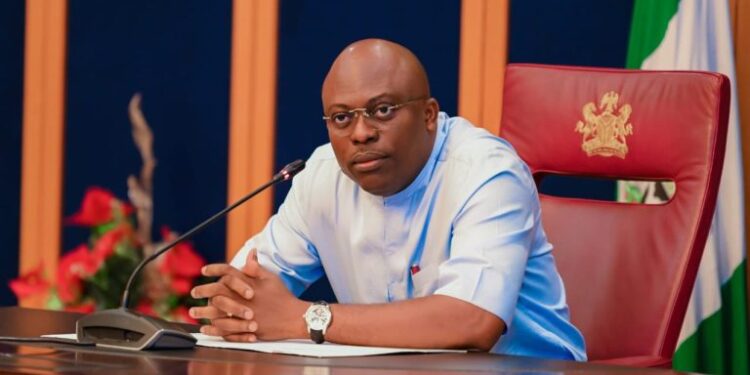Governor Siminalayi Fubara speaking when he received Muslim leaders from 20 Islamic-based groups in Port Harcourt.
Suspended Governor of Rivers State, Siminalayi Fubara, has assured residents that the ongoing political crisis in the state will ultimately strengthen the people rather than weaken them.
Fubara made this statement when he received Muslim leaders from 20 Islamic-based groups, including the Supreme Council for Islamic Affairs, at his private residence in Port Harcourt during an Eid-El-Fitr Sallah visit.
Addressing the delegation, Governor Fubara urged them and his supporters to trust in God’s process, saying: “This season is one of love, sharing, and sacrifice. You have come to share in our pain and have made a great sacrifice through your prayers. As Christians, we believe that everything happens for a purpose, and I strongly believe that this situation is leading us toward a greater purpose.”
He acknowledged that the current political tension might leave many feeling depressed but emphasised that supernatural forces may be at play beyond human understanding.
“No matter what we see, we must remain steadfast. In all things, we give glory to Almighty God. I believe that in the end, we will emerge stronger,” he added.
He reaffirmed his commitment to justice and equality, stressing that his administration envisions a society where no one is oppressed.
“We believe in egalitarianism, and if our beliefs bring us some pain, so be it. The most important thing is that we stand on the side of truth and righteousness,” he stated.
He regretted that he was unable to formally reach out to the Muslim community during their celebrations but promised that the relationship between religious groups and the government would be strengthened once the current uncertainties are resolved.
He also assured the leaders that their pending requests would be addressed after the crisis subsides.
Urging patience and perseverance, Governor Fubara drew an analogy from religious history, saying, “If God could be patient with Noah to allow even the snail to enter the Ark, then patience remains an essential virtue in our struggle.”
He also cautioned against falling prey to those who want engineer violence by fanning provocative acts, warning his supporters and Rivers people to avoid certain elements who sought to destabilize the state.
“Their goal is to create problems and deny people their means of livelihood. We will not allow that. We will continue to operate peacefully and respect constitutional authority to ensure that our state remains a model for others in Nigeria,” he concluded.
Speaking earlier on behalf of the Muslim community, Alhaji Nasir Awhelebe Uhor, declared their solidarity with Governor Siminalayi Fubara, assuring him of their prayers and support as he navigates the state’s current political challenges.
Alhaji Uhor stated that the majority of Muslims in Rivers State stand with Governor Fubara due to his inclusive approach to governance and his recognition of the Islamic faith.
He noted that unlike the previous administration that declared Rivers a 100% Christian state, Governor Fubara, upon assuming office, acknowledged the state as Christian majority while allowing room for inclusiveness.
Encouraging the governor to remain steadfast, Uhor reminded him of the Islamic belief that Allah rewards patience.
He said the present challenges align with the teachings of Islam, where the Creator tests His people through wealth, power, and authority.
He further called on President Bola Tinubu to review the emergency rule in Rivers State and restore Governor Fubara’s full authority, emphasizing that the governor has been performing effectively despite the crisis.
During the visit, prayers were offered for suspended Governor Fubara, his family, Rivers State, and Nigeria as a whole.











